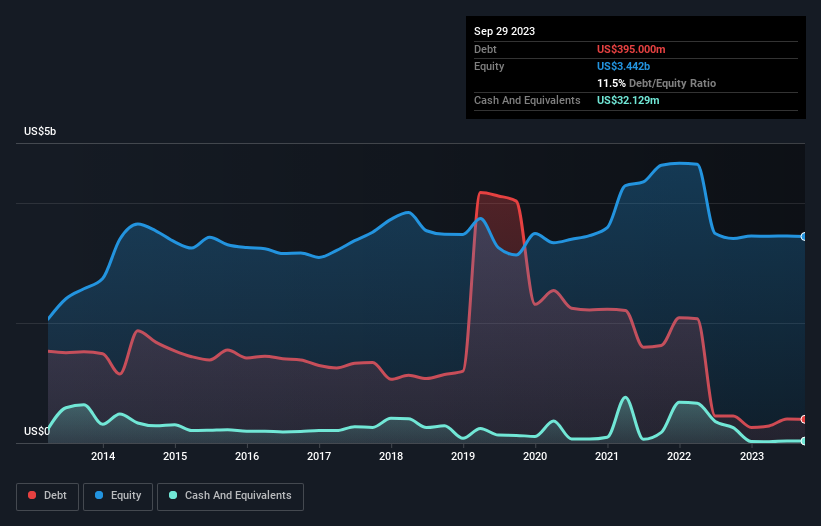Warren Buffett famously said, 'Volatility is far from synonymous with risk.' So it seems the smart money knows that debt - which is usually involved in bankruptcies - is a very important factor, when you assess how risky a company is. We can see that Enovis Corporation (NYSE:ENOV) does use debt in its business. But is this debt a concern to shareholders?
What Risk Does Debt Bring?
Debt and other liabilities become risky for a business when it cannot easily fulfill those obligations, either with free cash flow or by raising capital at an attractive price. Ultimately, if the company can't fulfill its legal obligations to repay debt, shareholders could walk away with nothing. However, a more frequent (but still costly) occurrence is where a company must issue shares at bargain-basement prices, permanently diluting shareholders, just to shore up its balance sheet. Of course, the upside of debt is that it often represents cheap capital, especially when it replaces dilution in a company with the ability to reinvest at high rates of return. The first thing to do when considering how much debt a business uses is to look at its cash and debt together.
View our latest analysis for Enovis
What Is Enovis's Net Debt?
You can click the graphic below for the historical numbers, but it shows that Enovis had US$395.0m of debt in September 2023, down from US$449.2m, one year before. However, because it has a cash reserve of US$32.1m, its net debt is less, at about US$362.9m.

A Look At Enovis' Liabilities
The latest balance sheet data shows that Enovis had liabilities of US$355.3m due within a year, and liabilities of US$603.9m falling due after that. Offsetting these obligations, it had cash of US$32.1m as well as receivables valued at US$277.0m due within 12 months. So its liabilities total US$650.0m more than the combination of its cash and short-term receivables.
While this might seem like a lot, it is not so bad since Enovis has a market capitalization of US$3.16b, and so it could probably strengthen its balance sheet by raising capital if it needed to. But it's clear that we should definitely closely examine whether it can manage its debt without dilution. There's no doubt that we learn most about debt from the balance sheet. But it is future earnings, more than anything, that will determine Enovis's ability to maintain a healthy balance sheet going forward. So if you're focused on the future you can check out this free report showing analyst profit forecasts.
In the last year Enovis wasn't profitable at an EBIT level, but managed to grow its revenue by 6.9%, to US$1.7b. That rate of growth is a bit slow for our taste, but it takes all types to make a world.
Caveat Emptor
Importantly, Enovis had an earnings before interest and tax (EBIT) loss over the last year. Indeed, it lost US$13m at the EBIT level. When we look at that and recall the liabilities on its balance sheet, relative to cash, it seems unwise to us for the company to have any debt. So we think its balance sheet is a little strained, though not beyond repair. Another cause for caution is that is bled US$100m in negative free cash flow over the last twelve months. So suffice it to say we do consider the stock to be risky. For riskier companies like Enovis I always like to keep an eye on the long term profit and revenue trends. Fortunately, you can click to see our interactive graph of its profit, revenue, and operating cashflow.
Of course, if you're the type of investor who prefers buying stocks without the burden of debt, then don't hesitate to discover our exclusive list of net cash growth stocks, today.
Valuation is complex, but we're here to simplify it.
Discover if Enovis might be undervalued or overvalued with our detailed analysis, featuring fair value estimates, potential risks, dividends, insider trades, and its financial condition.
Access Free AnalysisHave feedback on this article? Concerned about the content? Get in touch with us directly. Alternatively, email editorial-team (at) simplywallst.com.
This article by Simply Wall St is general in nature. We provide commentary based on historical data and analyst forecasts only using an unbiased methodology and our articles are not intended to be financial advice. It does not constitute a recommendation to buy or sell any stock, and does not take account of your objectives, or your financial situation. We aim to bring you long-term focused analysis driven by fundamental data. Note that our analysis may not factor in the latest price-sensitive company announcements or qualitative material. Simply Wall St has no position in any stocks mentioned.
About NYSE:ENOV
Enovis
Operates as a medical technology company focus on developing clinically differentiated solutions in the United States and internationally.
Undervalued with moderate growth potential.
Similar Companies
Market Insights
Community Narratives



